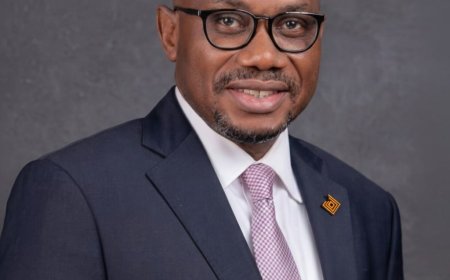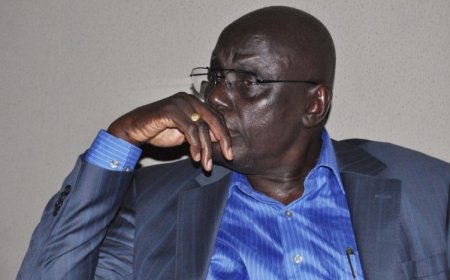The Uneasy Alliance: Faith, Finance, and the Rising Tide of Clergy Loan Defaults in Nigeria
Explore the growing crisis of clergy loan defaults in Nigeria, examining its impact on financial institutions, public trust in religious leaders, and the broader economic consequences.

By Dr Kreeno
Nigeria, a nation deeply rooted in faith and spirituality, has historically placed immense trust and reverence in its religious leaders, viewing them as moral compasses and custodians of ethical integrity. These clergy members are expected to exemplify financial discipline, honesty, and prudent stewardship over resources, both personal and institutional. However, in recent years, a troubling financial trend has emerged, raising serious concerns about the financial credibility of some clergy members. An increasing number of religious leaders, spanning various denominations, are defaulting on loans, accumulating overwhelming debt burdens, and struggling to meet their financial obligations. This unexpected development has sparked debates about the intersection of faith and financial responsibility, highlighting the complexities of religious leadership in a modern economic landscape.
The implications of this trend extend beyond personal financial hardship; it has a ripple effect on banking institutions that once regarded clergymen as low-risk borrowers due to their presumed integrity. As loan defaults amongst religious leaders rise, financial institutions are becoming more cautious, leading to tightened lending policies and stricter credit assessments. Moreover, the growing financial instability among the clergy threatens to erode public trust in religious institutions, as followers begin to question the credibility of leaders who preach financial prudence but struggle with debt themselves. This dissonance between spiritual teachings and financial realities raises ethical concerns and exposes vulnerabilities in financial literacy amongst religious leaders and their congregation where teachings of religiosity that has no significant meaningful impact in the marketplaces. Given the gravity of the situation, a thorough examination of its root causes, broader societal impact, and potential solutions is essential to restoring faith in both religious institutions and financial systems alike.
The Allure of Prosperity and Easy Credit
The allure of financial prosperity, often preached from the pulpit, can be seductive. While some clergymen genuinely seek loans to support their families, invest in church projects, or fund personal development, the reality is that many venture into risky business ventures, succumb to lavish lifestyles, or become entangled in complex financial schemes1. This ambition, coupled with a lack of financial literacy and a culture of easy credit, sets the stage for potential defaults.
In Nigeria, it has become increasingly common for churches to obtain bank loans, particularly in major commercial cities like Lagos, Abuja, Port Harcourt, and Warri1. These loans are often used to purchase land, build auditoriums, and occasionally establish ventures such as schools and hospitals. To facilitate access to credit, some churches have begun taking bookkeeping more seriously, employing accountants and internal auditors1.
The Impact of Clergy Loan Defaults
Financial Institutions and Economic Growth
The repercussions of clergy loan defaults are far-reaching. Firstly, they undermine the financial stability of lending institutions at all levels. Clergymen are often regarded as low-risk borrowers due to their perceived integrity and strong community standing. However, when a substantial number fail to meet their loan obligations—and some even resort to labeling creditors with derogatory terms like "thugs," as witnessed in a church led by an octogenarian founding father of the Pentecostal Fellowship of Nigeria (PFN) — it triggers a ripple effect. Banks grow increasingly cautious, leading to stricter lending policies that can stifle economic growth and restrict access to capital for genuine entrepreneurs.
According to a report by the Central Bank of Nigeria (CBN), loan default rates in the country have been on the rise. In the fourth quarter of 2024, Nigerian banks experienced higher loan defaults, particularly in corporate lending and unsecured loans7. This trend is likely to impact the willingness of banks to extend credit to various sectors, including religious institutions.

Erosion of Public Trust
Secondly, clergy loan defaults significantly damage public trust in religious institutions. When a clergy member struggles with debt, it creates a stark contradiction between their financial conduct and the moral values they preach in religious centers. This inconsistency breeds disillusionment among congregants, leading to a decline in faith and skepticism toward financial contributions for so-called church projects—often solicited under the guise of “It is for the Lord,” but in reality, serving personal interests. The very foundation of pastoral authority, built on trust and integrity, is at risk of crumbling. This erosion of credibility is already evident, particularly amongst prominent Pentecostal churches (names withheld), as KREENO Debt Recovery and Private Investigation (KREENO) actively pursues debt recovery from smaller clergies within these established churches whilst also conducting doctoral research on integrity in business, particularly in relation to borrowing and loan repayment ethics.
In a country where religion plays a significant role in people's lives, with Christians making up a substantial portion of the population, the impact of such erosion of trust can be far-reaching2. Nigeria is projected to have the third-largest Christian population in the world by 2050, with an estimated 211 million believers2. The integrity in buisness of religious leaders is crucial in maintaining the faith and trust of this large population as they are supposed to be light that should shine in transforming society by the standrds of doing business in both the workplaces and marketplaces.
Just recently, an ex-Access Bank staff and YouTuber, Oluyomi Martins, who suffered a stroke and sadly passed away on February 26, 2025, had shared something troubling with me about four months prior. He had done a consultancy job for a former Access Bank boss related to excess bank charges. Trusting that the former Access Bank boss would honor their verbal agreement, Oluyomi didn’t formalize the deal with a written contract. However, when the bank eventually refunded the excess charges, the former Access Bank boss refused to pay him his commission. What makes this even more concerning is that this same individual is a pastor and a member of the Access Nation WhatsApp platform—acting as though he had every right to withhold payment for services rendered.
If this pastor knew he couldn’t pay the agreed success fee, why not at least renegotiate and offer a fair percentage? This kind of behavior not only damages trust but also contributes to the immense stress and financial hardship that, unfortunately, can lead to tragedies within congregations and workplaces.
- The Need For Private Investigators To Review AMCON'S Operations Over The Last Decade
- How Non Payment Of Your Debt Affect Your Integrity
- Strengthening Fight Against Financial Fraud in Nigeria
- Understanding The Dangers of Financial Fraud And How To Stay Clean
Mental and Spiritual Well-being of Clergy
Furthermore, the pressure of debt can impact the mental and spiritual well-being of the affected clergymen. The stress of looming deadlines, mounting interest rates, and potential legal repercussions can distract them from their pastoral duties, impacting their ability to effectively counsel and lead their congregations. This can lead to burnout, depression, and even abandonment of their calling.

Contributing Factors to Clergy Loan Defaults
The issue of clergy loan defaults is not a simple case of financial mismanagement; rather, it is the result of a combination of deeply interwoven factors that create a perfect storm of debt accumulation and financial instability. The contributing factors to clergy loan defaults are complex and interwoven:
Lack of Financial Literacy
Many clergymen lack formal financial training, making them vulnerable to poor investment decisions and unsustainable borrowing habits. This lack of financial literacy is not unique to the clergy but is a broader issue in Nigeria. The country's financial inclusion rate stands at about 64%, indicating that a significant portion of the population, including some religious leaders, may not have access to formal financial education and services6.
More News: Understanding The Dangers Of Financial Fraud In Nigeria
Arrogance of the Professionals Amongst the Clergies
There is a growing trend among certain clergies, particularly those with professional backgrounds in finance, accounting, and banking, who exhibit a sense of entitlement and arrogance when it comes to financial obligations. These individuals, having once held prestigious positions as chartered accountants, top executives, or former bankers, often manipulate financial principles to their advantage when dealing with debts and loan obligations. Instead of adhering to ethical financial practices, they use their expertise to twist the narrative, arguing that the compounding interest on a loan accrued over the years should be calculated as simple interest. This not only displays a defiant disregard for financial agreements but also exposes a self-righteous, defrauding nature that contradicts the very principles of honesty and integrity that they preach.
Rather than honoring their commitments, they leverage their knowledge of financial loopholes and legal technicalities to evade repayment, often justifying their actions under the guise of supposed unfair lending practices. Such arrogance undermines the credibility of religious institutions, as congregants and financial institutions begin to see these leaders not as figures of trust but as cunning manipulators of the system. This behavior is not only unethical but also deeply hypocritical, as they expect their followers to be truthful and responsible while they themselves engage in deceitful financial practices. The ripple effect of this arrogance leads to financial institutions becoming wary of lending to clergies and religious institutions, further diminishing the trust that once existed between faith-based organizations and the business world. Ultimately, such conduct erodes the moral authority of these leaders, as their actions reveal a stark contrast between their public teachings on righteousness and their private financial dealings.
Pressure to Meet Financial Expectations
The expectation to support their families, maintain a certain lifestyle, and contribute to church projects can drive clergymen towards debt. In some cases, the pressure to build impressive church structures or expand ministries leads to taking on substantial loans1. The repayment of these loans often relies on tithes and offerings from the congregation, which can be unpredictable and insufficient to cover the debt obligations.
Get-Rich-Quick Schemes
The temptation of quick riches through dubious investments can lead to financial ruin. Nigeria has seen its fair share of financial scams and pyramid schemes, and clergymen are not immune to these enticements. The promise of high returns on investments can be particularly alluring to those seeking to fund church projects or improve their personal financial situations.
Poor Governance within Religious Institutions
In some cases, a lack of transparency and accountability in church finances can create opportunities for mismanagement and misappropriation of funds, ultimately impacting the financial stability of individual clergymen. The absence of proper financial oversight within religious organizations can lead to a culture of financial irresponsibility that extends to personal borrowing habits.
The Broader Context of Loan Defaults in Nigeria
To understand the issue of clergy loan defaults, it's essential to consider the broader context of loan defaults in Nigeria. The country has faced challenges in managing loan defaults across various sectors:
National Housing Fund (NHF) Performance
A study on the performance of the National Housing Fund (NHF) in Nigeria revealed significant loan default rates. In 2016, the default rate reached 59.6%, a sharp increase from 20.9% in 20143. Various reasons were cited for these defaults, including job loss (29%), death of the mortgagor (14%), unwillingness to repay (14%), and non-payment by employers (14%)3.
Digital Loan Providers and Unethical Practices
The rise of digital loan providers in Nigeria has introduced new challenges. Some e-commerce platforms offering short-term loans have resorted to unprofessional conduct and illegal measures in recovering debts5. This includes sending threatening messages to borrowers and their contacts, which has led to increased stress and social stigma for those unable to repay their loans.
Economic Factors and Loan Defaults
Nigeria's economic challenges have contributed to the overall increase in loan defaults. Factors such as job losses, reduced disposable income, and changes in the national economic situation have all played a role in borrowers' inability to meet their loan obligations3. The COVID-19 pandemic has likely exacerbated these issues, putting additional financial strain on individuals and institutions.

Addressing the Issue: A Multi-Pronged Approach
Addressing the issue of clergy loan defaults requires a multi-pronged approach:
Financial Education and Counseling
Churches and religious organizations need to prioritize financial literacy programs for their leaders, equipping them with the tools to manage finances responsibly. This could include:
- Workshops on personal and organizational financial management
- Partnerships with financial institutions to provide tailored financial education
- Mentorship programs pairing financially savvy church members with clergy
Responsible Lending Practices
Banks should exercise due diligence and avoid offering excessively large loans without proper collateral and a thorough assessment of the borrower's ability to repay. This includes:
- Implementing stricter risk assessment protocols for loans to religious institutions especially the clergies that put forward their titleship as a way to becloud sense of judgment by the lending companies
- Offering financial counseling services alongside loan products
- Developing specialized loan products that align with the unique financial structures of religious organizations
Promoting Transparency and Accountability
Religious institutions should implement robust financial management systems to ensure transparency and accountability in the handling of church funds. This could involve:
- Regular financial audits conducted by independent firms
- Clear separation of personal and church finances
- Implementation of digital financial management tools to track income and expenses
Emphasis on Ethical Conduct
Religious leaders must uphold the highest ethical standards and prioritize integrity in business over personal gain when they step outside their church walls to engage in marketplace transactions, ensuring that their faith aligns with their financial dealings. They should refrain from using their religious titles as a means of coercion or undue influence to pressure lenders, business partners, or financial institutions into unethical agreements or unfair concessions. This includes honoring contractual obligations, making timely repayments on loans, and being transparent about financial commitments to avoid bringing disrepute to their religious office. Additionally, they must lead by example, demonstrating accountability and responsibility in all financial dealings to maintain public trust and reinforce the moral values they preach. Ultimately, religious leaders should recognize that integrity in business is just as crucial as integrity in ministry, as financial misdeeds can tarnish both their personal reputation and the credibility of their faith community.
- Developing and adhering to a code of financial ethics for clergy
- Regular training on ethical decision-making in financial matters
- Creating accountability structures within religious organizations
The Role of Government and Regulatory Bodies
The Nigerian government and regulatory bodies have a crucial role to play in addressing the issue of clergy loan defaults:
Strengthening Financial Regulations
The Central Bank of Nigeria (CBN) and other regulatory bodies should work to strengthen financial regulations that govern lending practices, particularly in relation to loans extended to religious institutions. This could include:
- Developing specific guidelines for loans to religious organizations
- Implementing stricter oversight of lending practices to prevent predatory lending
- Encouraging banks to develop specialized risk assessment models for loans to religious institutions
ADVERT

Promoting Financial Inclusion
The government should continue its efforts to promote financial inclusion, which can help improve financial literacy among all segments of the population, including religious leaders. The National Financial Inclusion Strategy aims to increase financial inclusion to 95% by 20246. Achieving this goal could significantly impact the financial management skills of clergy and their congregations.
Supporting Debt Counseling Services
Government and Private Anti Fraud Agencies could support the establishment of debt counseling services specifically tailored to religious organizations and leaders. These services could provide:
- Confidential financial advice and support
- Mediation services between lenders and borrowers
- Resources for financial recovery and debt management
The Way Forward: Balancing Faith and Finance
The rising tide of clergy loan defaults in Nigeria is a complex problem with far-reaching consequences. Addressing this issue requires a concerted effort from religious institutions especially from the founders abd leadership of those faith -based organizations, financial institutions, and individual clergymen to promote financial literacy, responsible lending practices, and ethical conduct.
By tackling this challenge head-on, Nigeria can ensure that faith and finance work in harmony, fostering a more prosperous and morally grounded society. This balance is crucial not only for the financial health of religious institutions but also for maintaining the trust and faith of the millions of Nigerians who look to their religious leaders for guidance and inspiration.
As Nigeria continues to grapple with economic challenges and religious tensions, addressing the issue of clergy loan defaults could serve as a stepping stone towards greater financial responsibility and ethical leadership across all sectors of society. It is an opportunity to reinforce the values of integrity, transparency, and accountability that are fundamental to both religious teachings and sound financial management.
In conclusion, the uneasy alliance between faith and finance in Nigeria, as exemplified by the rising tide of clergy loan defaults, presents both challenges and opportunities. By addressing this issue comprehensively, Nigeria can strengthen its financial institutions, consumer credit schemes, enhance the integrity in business with regards to borrowing and paying back what is borrowed with all acrued interests based on the agreed loan offers of its religious organizations, and ultimately contribute to the overall stability and prosperity of the nation.
Author:
Dr. Ohio O. Ojeagbase, FICA, FIDR
Chief Private Investigator/CEO
Kreeno Debt Recovery and Private Investigation Agency
A Subsidiary of KREENO Holdings LLC, USA
Citations:
- https://punchng.com/nigeria-where-its-easier-for-churches-to-obtain-bank-loans-than-small-businesses/
- https://globalchristianrelief.org/christian-persecution/countries/nigeria/
- https://www.cbn.gov.ng/out/2021/rsd/occasional%20paper%20no.%2074.pdf
- https://www.cetri.be/Ethno-religious-Identity-and
- https://africachinareporting.com/how-digital-loan-providers-breach-data-privacy-violate-rights-of-nigerians/
- https://documents1.worldbank.org/curated/en/526171611619063445/pdf/Nigeria-Country-Partnership-Framework-for-the-Period-FY21-FY25.pdf
- https://www.arise.tv/nigerian-banks-saw-higher-loan-defaults-in-q4-2024-cbn-report-reveals/
- https://www.usmcu.edu/Portals/218/Crisis%20of%20the%20African%20State.pdf
Kindly share this story:
Contact: report@probitasreport.com
Stay informed and ahead of the curve! Follow The ProbitasReport Online News Report on WhatsApp for real-time updates, breaking news, and exclusive content especially when it comes to integrity in business and financial fraud reporting. Don't miss any headline – and follow ProbitasReport on social media platforms @probitasreport
[©2025 ProbitasReport - All Rights Reserved. Reproduction or redistribution requires explicit permission.]
........................................................................................................................................................................................................................................................................
ADVERT: FOR ALL YOUR JUBEP, PRE-DEGREE, UNDERGRADUATES, MASTERS, DOCTORAL PROGRAMS, JOIN ME AT ABUAD BUSINESS SCHOOL
Contact Information:
ABUAD Business School, Ibadan Campus: 13, Osuntokun Avenue, Bodija, Ibadan
Mrs. Ezekpo Funmilola (Assistant Registrar, Exams and Records)
WhatsApp Only: 0902 505 0410 and Phone: 0806 379 5399
What's Your Reaction?





































































































